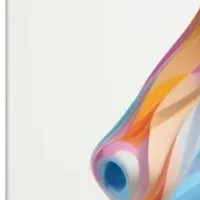
Chengdu: A Hub of Science Fiction Inspires Global Imagination
The landscape of science fiction has historically been dominated by classic works from Europe and America, such as �39Star Wars', '20,000 Leagues Under the Sea', and 'Journey to the Center of the Earth'. However, the genre has undergone a significant transformation since the rise of Chinese science fiction, particularly through the works of author Liu Cixin. In 2015, Liu became the first Asian author to win the prestigious Hugo Award for his novel 'The Three-Body Problem' during the 73rd World Science Fiction Convention. This marked a pivotal moment for Chinese science fiction, drawing global attention and offering a fresh perspective on the genre.
The accolades did not stop there; the growing influence of Chinese science fiction was further exemplified by the recent 81st World Science Fiction Convention hosted in Chengdu in 2023. This was a groundbreaking event, as it was not only the first time this convention was held in China, but also only the second occasion it took place in Asia. Today, 'The Three-Body Problem' has been translated into over thirty languages and has captivated audiences worldwide through both its novel form and various screen adaptations.
While many are aware of Liu Cixin's achievements, few realize that the first volume of his trilogy was originally serialized in a Chengdu-based science fiction magazine, 'Science Fiction World'. The magazine played a significant role in nurturing local talent and fostering interest in science fiction literature in the region.
To further promote the science fiction industry in Chengdu and enhance international cooperation, the National Business Daily organized the International Science Fiction Industry Salon on May 28, 2025. This event was hosted by the NBD Think Tank and brought together prominent companies and experts to discuss the future of the sci-fi sector. Among the participants were representatives from the French publishing group Hachette—one of the largest publishing houses globally—and D'Art Shtajio, a pioneering anime studio based in Japan that is led by African American creators.
During the salon, distinguished guests shared insights on developing science fiction franchises, managing intellectual property, and producing animated content. Topics of discussion included creating an 'ideal environment for science fiction innovation' and 'deepening cross-border collaboration in the industry'. International experts, such as Brigitte Leblanc, the Editor-in-Chief at 'Le Rayon Imaginaire', and Dalton Grant, an American animation director known for his work on films like 'Cars' and 'Shrek', underscored the importance of science fiction in sparking unexpected creativity and pushing boundaries.
Leblanc specifically highlighted the global success of 'The Three-Body Problem' as a model for international collaboration on franchises. The organizers of the event believe that platforms like this can propel the Chengdu science fiction industry towards greater diversity, depth, and global integration, while also showcasing the reach of Chinese science fiction works abroad.
The developments in Chengdu illustrate how the city is not just a participant but a pivotal player in the global science fiction narrative. By hosting such influential events and fostering dialogue among creators from different cultural backgrounds, Chengdu is laying the groundwork for a future enriched with innovative storytelling and collaborative projects. As the world of science fiction continues to expand, Chengdu stands ready to inspire dreams and aspirations beyond borders.
Through its engagement with international partners and its commitment to nurturing local talent, the city aims to position itself as a beacon of science fiction creativity. In doing so, Chengdu is not just keeping pace with global trends, but actively shaping the future of this ever-evolving genre, illustrating the power of storytelling in bridging cultures and imagining new possibilities for humanity.
The accolades did not stop there; the growing influence of Chinese science fiction was further exemplified by the recent 81st World Science Fiction Convention hosted in Chengdu in 2023. This was a groundbreaking event, as it was not only the first time this convention was held in China, but also only the second occasion it took place in Asia. Today, 'The Three-Body Problem' has been translated into over thirty languages and has captivated audiences worldwide through both its novel form and various screen adaptations.
While many are aware of Liu Cixin's achievements, few realize that the first volume of his trilogy was originally serialized in a Chengdu-based science fiction magazine, 'Science Fiction World'. The magazine played a significant role in nurturing local talent and fostering interest in science fiction literature in the region.
To further promote the science fiction industry in Chengdu and enhance international cooperation, the National Business Daily organized the International Science Fiction Industry Salon on May 28, 2025. This event was hosted by the NBD Think Tank and brought together prominent companies and experts to discuss the future of the sci-fi sector. Among the participants were representatives from the French publishing group Hachette—one of the largest publishing houses globally—and D'Art Shtajio, a pioneering anime studio based in Japan that is led by African American creators.
During the salon, distinguished guests shared insights on developing science fiction franchises, managing intellectual property, and producing animated content. Topics of discussion included creating an 'ideal environment for science fiction innovation' and 'deepening cross-border collaboration in the industry'. International experts, such as Brigitte Leblanc, the Editor-in-Chief at 'Le Rayon Imaginaire', and Dalton Grant, an American animation director known for his work on films like 'Cars' and 'Shrek', underscored the importance of science fiction in sparking unexpected creativity and pushing boundaries.
Leblanc specifically highlighted the global success of 'The Three-Body Problem' as a model for international collaboration on franchises. The organizers of the event believe that platforms like this can propel the Chengdu science fiction industry towards greater diversity, depth, and global integration, while also showcasing the reach of Chinese science fiction works abroad.
The developments in Chengdu illustrate how the city is not just a participant but a pivotal player in the global science fiction narrative. By hosting such influential events and fostering dialogue among creators from different cultural backgrounds, Chengdu is laying the groundwork for a future enriched with innovative storytelling and collaborative projects. As the world of science fiction continues to expand, Chengdu stands ready to inspire dreams and aspirations beyond borders.
Through its engagement with international partners and its commitment to nurturing local talent, the city aims to position itself as a beacon of science fiction creativity. In doing so, Chengdu is not just keeping pace with global trends, but actively shaping the future of this ever-evolving genre, illustrating the power of storytelling in bridging cultures and imagining new possibilities for humanity.
Topics Entertainment & Media)










【About Using Articles】
You can freely use the title and article content by linking to the page where the article is posted.
※ Images cannot be used.
【About Links】
Links are free to use.